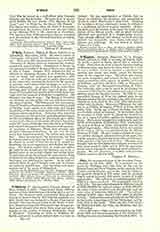

O’Herlahy (O’ HIARLAITHE), THOMAS, Bishop of Ross, Ireland, d. 1579. Consecrated about 1560, he was one of three Irish bishops attending the Council of Trent. He incurred such persecution through enforcing its decrees that he fled with his chaplain to a little island, but was betrayed to Perrot, President of Munster, who sent him in chains to the Tower of London. Simultaneously with Primate Creagh, he was confined until released after about three years and seven months on the security of Cormac MacCarthy, Lord of Muskery. Intending to retire to Belgium, ill-health contracted in prison induced him to return to Ireland. He was apprehended at Dublin, but released on exhibiting his discharge, and proceeded to Muskery under MacCarthy’s protection. Disliking the lavishness of that nobleman’s house, he withdrew to a small farm and lived in great austerity. Relieving distress to the utmost of his power he made a visitation of his diocese yearly, and on great festivals officiated and preached in a neighboring church. Thus, though afflicted with dropsy, he lived until his sixtieth (or seventieth) year, dying exhausted by labors and sufferings. He was buried in Kilcrea Friary, Co. Cork.

